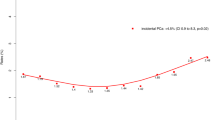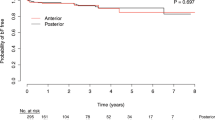Abstract
Background:
To investigate racial differences in tumor burden (cancer volume, cancer percentage and cancer to PSA ratios) in a large cohort of men undergoing radical prostatectomy (RP).
Methods:
Demographic, clinical and pathological data of patients undergoing RP between 1993–2010 were reviewed and compared between African-American (AA) and non African-American (nAA) men. Further assessments of pathological tumor burden (estimated tumor volume, percent of cancer involvement, and estimated tumor volume/PSA ratios) were performed across Gleason score categories.
Results:
Of 4157 patients in the analysis, 604 (14.5%) were AA. Overall, AA patients were younger, had higher Gleason scores, PSA levels and incidence of palpable disease (all P<0.001). Despite comparable prostate weights (39.4 vs. 39.6 g), AA men had higher percent cancer involvement and estimated tumor volume (all P<0.001) but similar estimated tumor volume/PSA ratios (P>0.05). When stratified by Gleason scores, prostate weights were comparable; however, estimated tumor volume, percent cancer involvement and estimated tumor volume/PSA ratios were higher in AA men with low grade (⩽6) prostate cancer (PCa), similar in intermediate grade (7–8) and lower in high grade (9-10) PCa compared to nAA men.
Conclusions:
In this large series, AA patients had higher disease burden (estimated tumor volume, percent cancer involvement, estimated tumor volume/PSA ratios) compared to nAA but this association was especially pronounced in low grade (Gleason ⩽6) cancers. These data depict a complex picture of relations between race and tumor burden across the spectrum of PCa aggressiveness. Further investigation is warranted to understand the mechanisms of racial disparities in PCa.
This is a preview of subscription content, access via your institution
Access options
Subscribe to this journal
Receive 4 print issues and online access
$259.00 per year
only $64.75 per issue
Buy this article
- Purchase on Springer Link
- Instant access to full article PDF
Prices may be subject to local taxes which are calculated during checkout
Similar content being viewed by others
References
American Cancer Society. Cancer Facts and Figures 2010 Atlanta: American Cancer Society; 2010.
Chornokur G, Dalton K, Borysova ME, Kumar NB . Disparities at presentation, diagnosis, treatment, and survival in African American men, affected by prostate cancer. Prostate 2010; 71: 985–997.
Caire AA, Sun L, Polascik TJ, Albala DM, Moul JW . Obese African-Americans with prostate cancer (T1c and a prostate-specific antigen, PSA, level of <10 ng/ml) have higher-risk pathological features and a greater risk of PSA recurrence than non-African-Americans. BJU Int 2010; 106: 1157–1160.
Evans S, Metcalfe C, Ibrahim F, Persad R, Ben-Shlomo Y . Investigating Black-White differences in prostate cancer prognosis: A systematic review and meta-analysis. Int J Cancer 2008; 123: 430–435.
Moul JW, Connelly RR, Lubeck DP, Bauer JJ, Sun L, Flanders SC et al. Predicting risk of prostate specific antigen recurrence after radical prostatectomy with the center for prostate disease research and cancer of the prostate strategic urologic research endeavor databases. J Urol 2001; 166: 1322–1327.
Tarman GJ, Kane CJ, Moul JW, Thrasher JB, Foley JP, Wilhite D et al. Impact of socioeconomic status and race on clinical parameters of patients undergoing radical prostatectomy in an equal access health care system. Urology 2000; 56: 1016–1020.
Freedland SJ, Amling CL, Dorey F, Kane CJ, Presti JC, Terris MK et al. Race as an outcome predictor after radical prostatectomy: results from the shared equal access regional cancer hospital (search) database. Urology 2002; 60: 670–674.
Resnick MJ, Canter DJ, Guzzo TJ, Brucker BM, Bergey M, Sonnad SS et al. Does race affect postoperative outcomes in patients with low-risk prostate cancer who undergo radical prostatectomy? Urology 2009; 73: 620–623.
Tewari A, Horninger W, Badani KK, Hasan M, Coon S, Crawford ED et al. Racial differences in serum prostate-specific antigen (PSA) doubling time, histopathological variables and long-term PSA recurrence between African-American and white American men undergoing radical prostatectomy for clinically localized prostate cancer. BJU Int 2005; 96: 29–33.
Moul JW, Connelly RR, Mooneyhan RM, Zhang W, Sesterhenn IA, Mostofi FK et al. Racial differences in tumor volume and prostate specific antigen among radical prostatectomy patients. J Urol 1999; 162: 394–397.
Sanchez-Ortiz RF, Troncoso P, Babaian RJ, Lloreta J, Johnston DA, Pettaway CA . African-American men with nonpalpable prostate cancer exhibit greater tumor volume than matched white men. Cancer 2006; 107: 75–82.
Pettaway CA, Troncoso P, Ramirez EI, Johnston DA, Steelhammer L, Babaian RJ . Prostate specific antigen and pathological features of prostate cancer in black and white patients: a comparative study based on radical prostatectomy specimens. J Urol 1998; 160: 437–442.
Powell IJ, Bock CH, Ruterbusch JJ, Sakr W . Evidence supports a faster growth rate and/or earlier transformation to clinically significant prostate cancer in black than in white American men, and influences racial progression and mortality disparity. J Urol 2010; 183: 1792–1796.
Epstein JI, Partin AW, Sauvageot J, Walsh PC . Prediction of progression following radical prostatectomy. A multivariate analysis of 721 men with long-term follow-up. Am J Surg Path 1996; 20: 286–292.
Gleason DF, Mellinger GT . Prediction of prognosis for prostatic adenocarcinoma by combined histological grading and clinical staging. J Urol 1974; 111: 58–64.
Banez LL, Terris MK, Aronson WJ, Presti JC, Kane CJ, Amling CL et al. Race and time from diagnosis to radical prostatectomy: does equal access mean equal timely access to the operating room?--Results from the SEARCH database. CEBP 2009; 18: 1208–1212.
Mohler JL, Gaston KE, Moore DT, Schell MJ, Cohen BL, Weaver C et al. Racial differences in prostate androgen levels in men with clinically localized prostate cancer. J Urol 2004; 171 (6 Pt 1): 2277–2280.
Bangsi D, Zhou J, Sun Y, Patel NP, Darga LL, Heilbrun LK et al. Impact of a genetic variant in CYP3A4 on risk and clinical presentation of prostate cancer among white and African-American men. Urol Oncol 2006; 24: 21–27.
deVere White RW, Deitch AD, Jackson AG, Gandour-Edwards R, Marshalleck J, Soares SE et al. Racial differences in clinically localized prostate cancers of black and white men. J Urol 1998; 159: 1979–1982 ; discussion 82-3.
Acknowledgements
LLB and LG supported by research was supported research funds from the Committee for Urologic Research, Education, and Development (CURED) of Duke University.
Author information
Authors and Affiliations
Corresponding author
Ethics declarations
Competing interests
The authors declare no conflict of interest.
Rights and permissions
About this article
Cite this article
Tsivian, M., Bañez, L., Keto, C. et al. African-American men with low-grade prostate cancer have higher tumor burdens: Results from the Duke Prostate Center. Prostate Cancer Prostatic Dis 16, 91–94 (2013). https://doi.org/10.1038/pcan.2012.39
Received:
Revised:
Accepted:
Published:
Issue Date:
DOI: https://doi.org/10.1038/pcan.2012.39
Keywords
This article is cited by
-
Progression on active surveillance for prostate cancer in Black men: a systematic review and meta-analysis
Prostate Cancer and Prostatic Diseases (2022)
-
Proteomic characterization of paired non-malignant and malignant African-American prostate epithelial cell lines distinguishes them by structural proteins
BMC Cancer (2017)
-
Assessment of prostate cancer aggressiveness using apparent diffusion coefficient values: impact of patient race and age
Abdominal Radiology (2017)
-
Prostate cancer in men of African origin
Nature Reviews Urology (2016)



